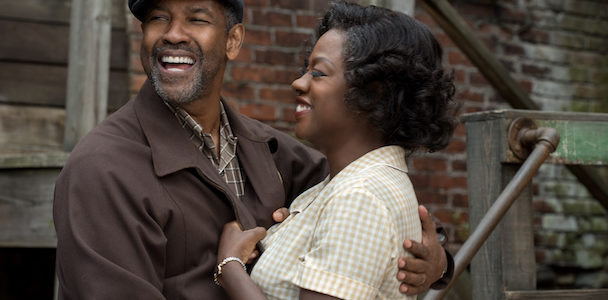
ReelBob: ‘Fences’
By Bob Bloom
“Fences” is a splendid film adaptation of August Wilson’s Pulitzer Prize-winning and Tony Award-winning drama that, though “opened up” for cinematic purposes, retains the emotional power of the Broadway presentation.
That is mainly due to Denzel Washington, who does double duty as the film’s director and star.
Washington, as Troy Maxson, and Viola Davis, as his wife, Rose, are familiar with the material, having performed it together on stage.
Still, they bring a vibrancy and freshness to the feature, set in the late 1950s in Pittsburgh, that, despite some staginess, makes you want to spend time with and learn more about the family.
Troy, who works as a garbage collector in Pittsburgh, is a bitter man who feels he has been standing still for almost 18 years.
He is a former Negro League baseball star and ex-convict who believes that race and prejudice has kept him from fulfilling his dreams.
He rules his house like a tyrant, barking orders at Rose and their son, Cory, like a Marine drill sergeant. At other times, he shows a tenderness, as he kisses Rose and extols her virtues.
Because of his failures, Troy continually battles Cory, who plays football in high school and is good enough to garner the attention of a college recruiter.
Troy, though, holds him back, insisting Cory learn a trade because “the white man” will not allow him to succeed at sports.
The angry Troy projects his own disappointments onto Cory, creating a conflict of wills that continually builds tensions within the family, as Rose unsuccessfully tries to mediate between the two.
“Fences” is more a character study than a plot-driven drama. It’s a look at a proud and defiant man confronting his shortcomings and demons, while bullying those closest to him to sustain the respect he craves and believes he has earned by putting food on the table and a roof over their heads.
And while race is a factor in “Fences,” Wilson’s themes and generational struggles are universal truths that can be applied to any ethnicity.
The performances are first rate. At times, you dislike Washington’s Troy, while simultaneously pitying him. He is color blind, refusing to see how times have changed, while believing that he is protecting his son instead of tying him to a past that is quickly receding.
As a director, Washington knows how to use the cadences of Wilson’s words to deepen their impact. He shoots most of the action in the kitchen, parlor and backyard of the Maxson house, but also films in the neighborhood, giving the audience a wider perspective of the family’s environment.
Davis is magnificent as Rose, who has stood beside Troy for 18 years, trying in various ways, to make him look forward instead of back.
She bears insults and indignities from her husband, until she finally explodes, releasing a torrent of frustrations that he has been either too blind or selfish to see.
Jovan Adepo as Cory reveals a young man slowly finding himself and breaking off the domineering shackles tying him to his father.
“Fences” is a dialogue-driven vehicle, with Wilson’s words flowing like music or poetry.
The film is the next best thing to seeing a stage production of this 20th-century classic. Its power, compassion and intimacy crashes through the screen and into your heart.
Bob Bloom is a member of the Indiana Film Journalists Association. His reviews appear at ReelBob (reelbob.com) and Rottentomatoes (www.rottentomatoes.com). He also reviews Blu-rays and DVDs. He can be reached by email at bobbloomjc@gmail.com or on Twitter @ReelBobBloom.
FENCES
3½ stars out of 4
(PG-13), adult situations and themes, language, suggestive sexual references